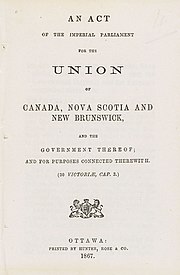| Dow v Black | |
|---|---|
 The British North America Act, 1867 set out the powers of the federal and provincial governments | |
| Court | Judicial Committee of the Privy Council |
| Full case name | James Dow and others v William T. Black and others |
| Decided | March 5, 1875 |
| Citations | (1874-75), 6 AC 272, [1875] UKPC 17, 1 Cart BNA 95 (PC) |
| Case history | |
| Prior actions | The Queen v. Dow (1873), 14 NBR 300, 1 Cart BNA 108 (NB SC) |
| Appealed from | Supreme Court of New Brunswick |
| Court membership | |
| Judges sitting | Sir James W. Colville Lord Justice James Lord Justice Mellish Sir Montague E. Smith |
| Case opinions | |
| Province can enact a law authorising municipality to fund an inter-provincial railway | |
| Decision by | Sir James W. Colvile |
| Keywords | |
| Constitutional law; division of powers; inter-provincial railways; direct taxation; matters of a local and private nature | |
| R v Dow | |
|---|---|
| Court | Supreme Court of New Brunswick |
| Full case name | The Queen v Dow and others |
| Decided | February 22, 1873 |
| Citations | (1873), 14 NBR 300, 1 Cart BNA 108 (NB SC) |
| Case history | |
| Appealed to | Judicial Committee of the Privy Council |
| Subsequent action | Appeal allowed |
| Court membership | |
| Judges sitting | Ritchie C.J. Allen J. Weldon J. Fisher J. |
| Case opinions | |
| Province cannot enact a law authorising municipality to fund an inter-provincial railway | |
| Decision by | Allen J.; Ritchie C.J. and Weldon J. concurring Fisher J. (dissenting) |
| Keywords | |
| Constitutional law; division of powers; inter-provincial railways; direct taxation; matters of a local and private nature | |
Dow v Black is a Canadian constitutional law decision. Decided in 1875, it was one of the first major cases examining in detail the division of powers between the federal Parliament and the provincial Legislatures, set out in the Constitution Act, 1867 (originally known as the British North America Act, 1867). The issue was whether a provincial statute which authorised the municipality of St. Stephen, New Brunswick to issue a debenture to fund a railway connecting to the United States was within provincial jurisdiction as a local tax matter, or whether it intruded on federal jurisdiction over inter-provincial and international railways.
The case was decided by the Judicial Committee of the Privy Council, at that time the court of last resort for Canada within the British Empire. The Judicial Committee allowed an appeal from the Supreme Court of New Brunswick and held that the legislation was within provincial jurisdiction as a matter of local taxation, coming under sections 92(2) and 92(16) of the Constitution Act, 1867. The statute did not intrude on federal jurisdiction over inter-jurisdictional railways, under s. 91(29) and s. 92(10) of the Constitution Act, 1867.[1][2]
- ^ Dow v Black (1874-75), 6 AC 272, [1875] UKPC 17 (PC).
- ^ Constitution Act, 1867, 30 & 31 Victoria, c. 3 (UK); RSC 1985, App. II, No. 5.